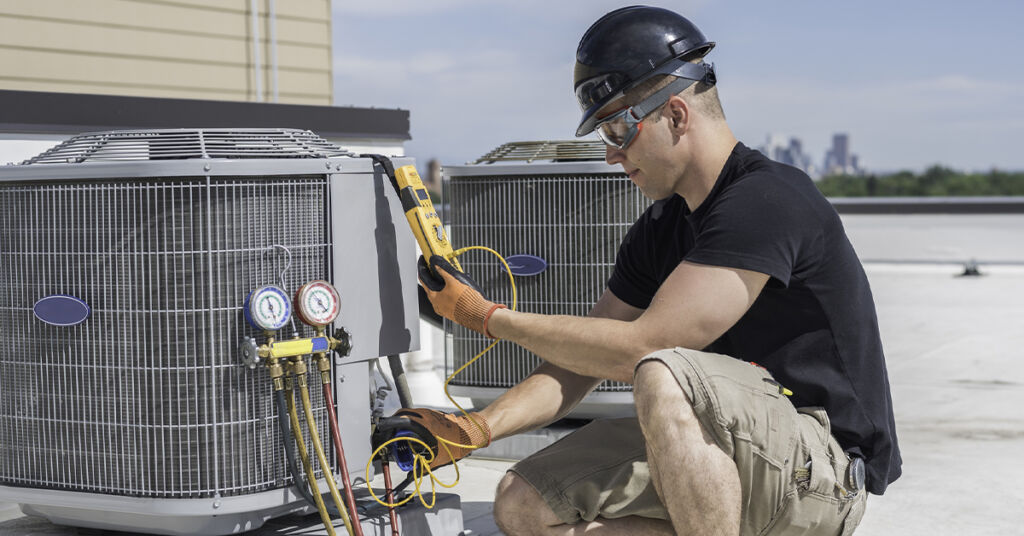
What Are HVAC Jobs?
“HVAC jobs” refer to occupations involved in the design, installation, maintenance, and repair of heating, ventilation, and air conditioning systems. These systems regulate temperature, humidity, and air quality in residential, commercial, and industrial buildings.
Common HVAC Roles:
- HVAC Technician – Installs, repairs, and maintains HVAC systems.
- HVAC Installer – Specializes in new HVAC system installations.
- HVAC Engineer – Designs systems and ensures compliance with regulations.
- Controls Technician – Works with automated HVAC systems.
- HVAC Sales Representative – Sells equipment and provides solutions to clients.
- Refrigeration Technician – Focuses on cooling systems like freezers and refrigerators.
Why Choose a Career in HVAC?
1. Job Stability
HVAC systems are essential, and demand for skilled workers remains strong. According to the U.S. Bureau of Labor Statistics, HVAC technician jobs are projected to grow 6% from 2022 to 2032, about as fast as the average for all occupations.
2. Competitive Salary
- Entry-level: $35,000–$45,000/year
- Experienced: $50,000–$70,000/year
- Senior roles or specialization: $80,000+
3. Pathways for Growth
HVAC professionals can advance into supervisory roles, become project managers, or start their own businesses. With continued training, many also transition into engineering or energy-efficiency consulting.
4. Hands-On Work
If you enjoy working with your hands and solving real-world problems, HVAC is a rewarding and dynamic field.
Required Skills and Qualifications
Technical Skills:
- Mechanical knowledge
- Electrical troubleshooting
- Understanding of thermodynamics and airflow
Soft Skills:
- Problem-solving
- Customer service
- Time management
- Communication
Education:
- High school diploma or GED (minimum)
- Completion of an HVAC training program or apprenticeship
- EPA Section 608 certification for refrigerant handling
Many technicians attend trade schools or community colleges for 6 months to 2 years. Some pursue associate degrees in HVAC technology.
How to Start Your HVAC Career
Step-by-Step Guide:
- Finish high school or equivalent
- Enroll in an accredited HVAC training program
- Gain hands-on experience via apprenticeship
- Get certified (EPA 608, NATE, etc.)
- Apply for entry-level HVAC jobs
- Continue education to specialize or advance
Real-World Example: Jason’s Career Path
Jason, a 28-year-old from Houston, began his career with a six-month HVAC certificate. He worked as an apprentice for one year, earned EPA certification, and now works as a full-time technician making over $60,000 annually. He’s currently studying part-time to become a system designer.
Where Do HVAC Professionals Work?
- Residential homes
- Commercial buildings (offices, malls, hotels)
- Industrial facilities (factories, plants)
- Hospitals and healthcare centers
- Government and military installations
- HVAC manufacturing companies
Job Outlook and Industry Trends
Green Energy and Sustainability
Modern HVAC systems focus on energy efficiency. Technicians trained in eco-friendly systems and smart controls are in high demand.
Smart Technology Integration
With IoT (Internet of Things) on the rise, HVAC systems are becoming smarter. Controls technicians with IT skills are especially valuable.
Licensing and Compliance
HVAC workers must adhere to local, state, and federal regulations. Staying updated on codes and certifications is essential for career advancement.
Challenges in the HVAC Industry
Physically Demanding
Jobs may require climbing ladders, lifting heavy equipment, or working in confined spaces.
Variable Hours
Emergency calls can happen anytime. HVAC technicians often work evenings, weekends, or holidays, especially in extreme weather.
Continuing Education
Technology evolves quickly. Ongoing training is required to stay competitive and knowledgeable.
How to Find HVAC Jobs
Job Boards:
- Indeed
- ZipRecruiter
- HVAC Agent
- Glassdoor
Networking:
Join local HVAC groups or LinkedIn communities. Attend trade shows and workshops to meet potential employers.
Tips for Success in HVAC
- Always be punctual and professional
- Stay curious and keep learning
- Invest in quality tools and safety gear
- Build trust with customers through clear communication
Conclusion: A Career That Pays Off
HVAC jobs offer stable, rewarding, and growth-oriented career paths for people who love hands-on work and problem-solving. With the growing focus on sustainable technology and energy efficiency, the demand for skilled HVAC professionals will only continue to rise. Whether you’re just starting out or looking to switch careers, HVAC is a smart, future-proof choice.
